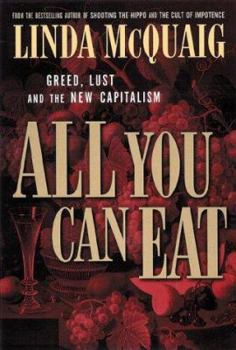All You Can Eat: Greed, Lust and the New Capitalism
Select Format
Select Condition 
Book Overview
No Synopsis Available.
Format:Hardcover
Language:English
ISBN:0670872792
ISBN13:9780670872794
Release Date:January 2001
Publisher:Penguin Group
Length:268 Pages
Weight:1.25 lbs.
Customer Reviews
3 ratings
A Rare Evaluation of Privatization from the Perspective of Feudal Society
Published by Thriftbooks.com User , 18 years ago
This important work guides us into a lost value system which sustained societies for millenia. Modern writers pay homage to capitalist or socialist ideologies but remain ignorant of the economic system that preceded them. This should be used in history courses in place of the self glorifying mythologies that we study.
Hits home
Published by Thriftbooks.com User , 21 years ago
Linda is a TO Star columninst and has a wonderful ability to look at the world from a detached perspective. If you like Michael Moore or Chomsky or Mel Hurtig than you must get this book! It is easy enough to read for the lay person so anyone should be able to digest it without a problem!
All you can eat
Published by Thriftbooks.com User , 21 years ago
First, let me sum up this book. In this book Linda McQuaig ...- critiques the new (post 1980) capitalism (which is based on neo-classical economics), in which greed is elevated to the primary human characteristic and virtue. She believes that the new capitalism helps the very rich, but increases our greed and social isolation and does not increase our happiness or help the 2.8 billion people who live on less than US$2 per day.- believes that our social nature is our primary characteristic, and our desire for collective protection (ie. from the ravages of the market) is also important. She accepts, though, that greed is natural and that it isn't bad, but she says it isn't primary and it should be controlled rather than encouraged.- shows how this model of humans as machines of personal accumulation has been used to denigrate government and the possibility of collective action.- describes how the new capitalism is spread through the new policies of the IMF and WB, and new trade treaties such as the NAFTA. She shows that these policies and deals abandon concern for anything other than economic growth, and that this hurts us. Third world countries are particularly hurt since they don't get to implement the policies of industrial protection and social stabilization that the first world countries employed in their own development. Her hero in this section is Stiglitz.- critiques the apologists of the new capitalism, Thomas Friedman and Dnish D'Szousa.- describes Red Vienna of the 1920's and 30's, and tells the story of Karl Polyani (author of the seminal book 'The Great Transformation').- discusses Polyani's rather bizarre but novel idea that prices could be set by the community, not by the market or by a central bureaucracy.- describes the hostile reaction to the free market during its development in England, showing that it wasn't universally beneficial and welcomed, but was forced on the majority by the elite.- defends the public sphere of life, of government and taxes, of collective space and action.- argues that the a pure free market and private property are not our natural mode of interaction. Instead, a mixed free market (with exchanges that are also based on redistribuation and reciprocity) embedded within and subverted to the overall needs of society is our natural state. This is based on the historical analysis of Polyani.Now, here are my complaints...- What's with the word 'Lust' in the title? This book has nothing to do with lust. I suspect that was put in by the marketing dept.- In her view everything is too black and white, eg. Stiglitz and especially Polyani are reverred. Could life really be like this?- Isn't capitalism starting to help alleviate poverty in India and China? Won't it eventually improve the lot of the 2.8 billion poor she mentions (I'm not saying it isn't destroying the environment, social cohesion, equality, etc.).- What is her prescription? Is she suggesting we return a classical economic model? Or is she






